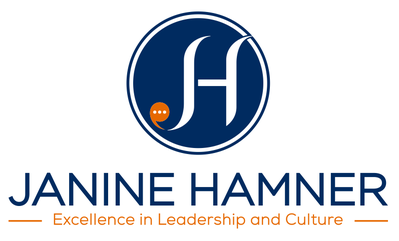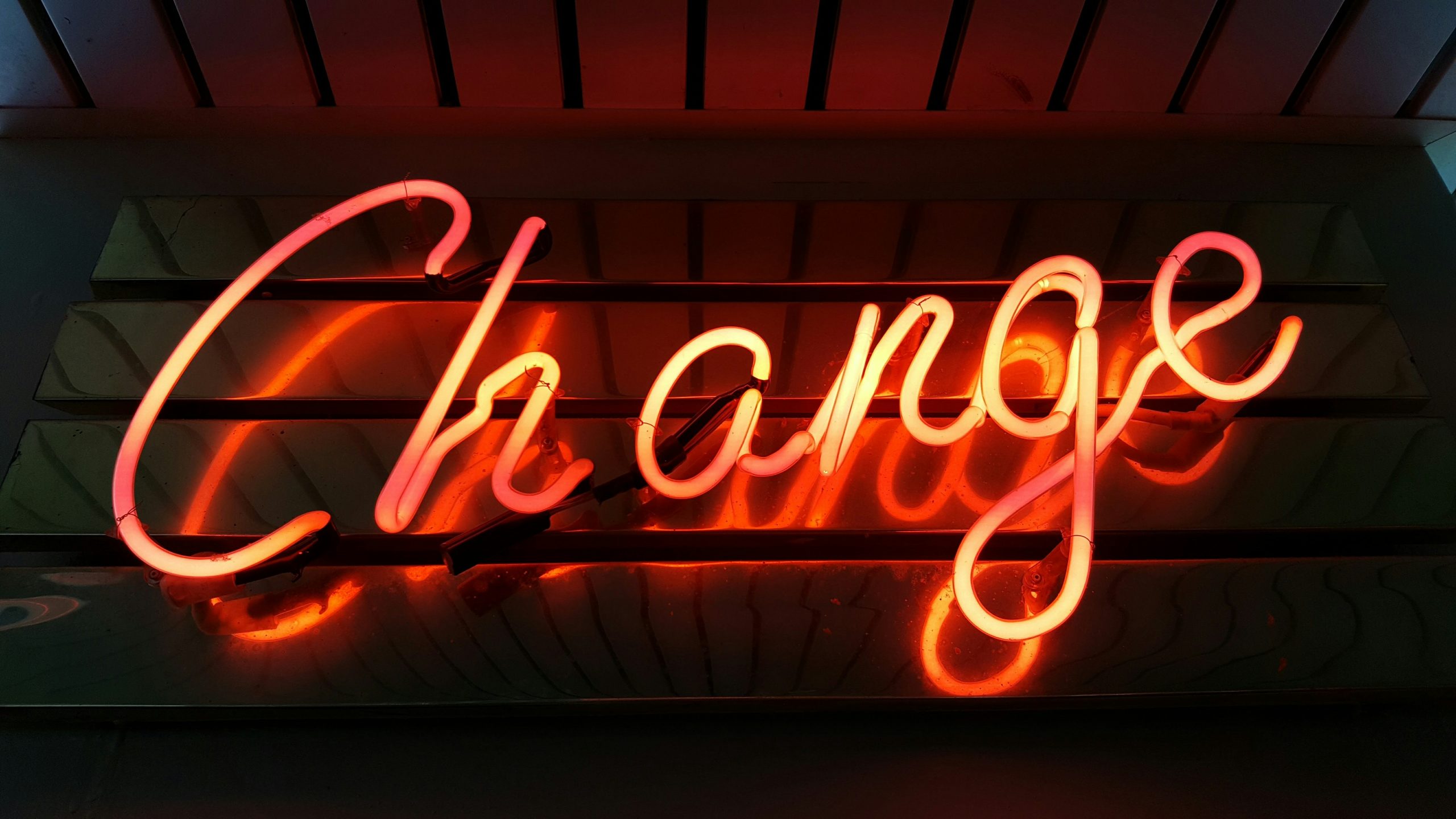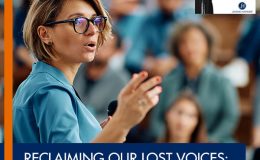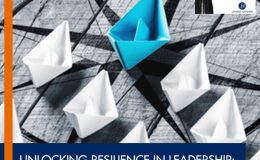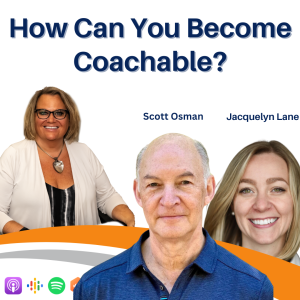
Have you considered working with a coach before? Do you wonder how, why, and when a coach can help in your career or business? In this episode, Janine Hamner Holman sits down with Jacquelyn Lane and Scott Osman, two coaching experts, to discuss the importance of good coaches in work and life.
GUESTS: Jacquelyn Lane | LinkedIn, Instagram, InstituteOfCoaching | Scott Osman | LinkedIn, InstituteOfCoaching
HOST: Janine Hamner Holman | [email protected] | LinkedIn, Facebook, Instagram
Welcome to The Cost of Not Paying Attention. We have two guests today, Jacquelyn Lane and Scott Osman. Jacquelyn is the president and Scott is the CEO of the 100 Coaches agency. They are also the co-authors of the Wall Street Journal bestselling book Becoming Coachable, which they wrote alongside their friend Marshall Goldsmith.
Jacquelyn and Scott, what is something you guys have realized that either the 100 Coaches team or the clients you work with have been failing to pay attention to and what’s the cost of that inattention? What’s the problem that inattention is causing?
(Jacquelyn) That’s such a great question, Janine. We sat down and we were trying to understand why it is that some coaching engagements go on to be wildly successful seemingly in not very much time at all, and why some coaching engagements seem to be less successful and take up more time and cause more frustration.
We sat down and had a conversation with a number of our coaches and people in our community. We realized no one was paying attention to a very important factor in any coaching engagement, which is how coachable the leader is.
That sent us on this journey of trying to understand what it means to be coachable. It ultimately led to writing our book Becoming Coachable. If you can master what we now call the four keys to becoming coachable, there’s a lot to be gained.
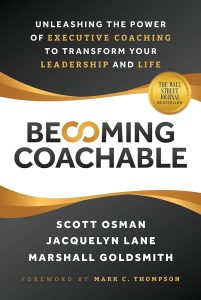
Awesome. Let’s get into it. Scott, give me one or four, whether you want to give me the overview or dive into them one at a time.
(Scott) We’ll jump into them one at a time. Well, okay. In asking people what it takes to become coachable, we started revealing one at a time, the four things we now call our openness framework. Oddly enough, the first one was the factor I struggled with the most. Somewhere in the book, I said I was not always coachable.
I began to understand I thought things had been going great and everything was in order. It turns out that by feeling comfortable, I was setting limits I couldn’t overcome. I wasn’t open to change. It was a little insidious. If you think about someone who’s not open to change, you think they’re dug in. I was the opposite. Things were so good and easy, I didn’t need to change. That’s a self-limiting belief.
The first part of the openness framework was being open to change. If you want to become coachable, you have to accept that change is a necessary part of the coaching relationship.
It’s a tricky thing for humans because we don’t like change. We like it here at 72 degrees where it’s comfortable and we know exactly what to do. We don’t grow at 72 degrees. We grow when we get uncomfortable, when we get out on that skinny limb.
(Jacquelyn) The funny thing was, I remember a gentleman who came to us and said he was looking for a coach and he commented, “I’m not looking to change. I want to change the perceptions of people around me.”
That’s a very funny thing. We all fall into that trap and think, “If only the other people in my life would change, then sweetness and light will be mine.” We have to model that behavior, especially if we’re leaders, we have to go first. If you’re going to be coached, you have to be open to that change.
(Scott) Also, change is unavoidable. There might’ve been a time decades ago when change was slow enough to go unnoticed, but those times have passed.
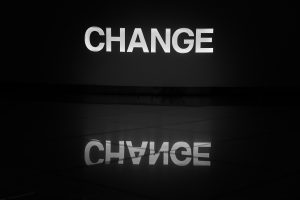
I was reading something yesterday from the CEO of Korn Ferry. He said we’ve had more change in the last four years than the oldest among us have had in our lifetimes. The pace of change is speeding up. The kinds of change we’re being challenged to rise to are increasing.
If we are a leader getting comfortable with change, and what I call getting comfortable with being uncomfortable, is tricky. It’s a key component to being coachable.
(Jacquelyn) The second element in becoming coachable is you have to be open to receiving feedback.
(Scott) Everybody laughs at that one. “Sure, no problem.”
(Jacquelyn) We all love feedback.
So much.
(Jacquelyn) Exactly. When a friend or family member says, “Hey, can I give you some feedback?” You automatically steal yourself for the worst. That’s a normal response. Our friend Marshall Goldsmith tells us the importance of feedback, and that all feedback is a gift. There’s a great shorthand he uses to get around this, he uses the word feed forward. Rather than saying what was done wrong, the right step is advice, input, and suggestions from people for how you can do things differently or better in the future.
We are all, without realizing it, doing things that get in our way, we often call these blind spots. We can’t become aware of our blind spots if we don’t have feedback or input from others. Especially as a leader, you can’t be truly self-aware of your leadership without understanding the impact on other people.
Feedback is an important part of this process. A great coach is going to be someone who can help provide that feedback in a way you can hear it. In the process of becoming coachable, you become much more skilled at hearing feedback from all the other sources in your life as well.
For me, that was a big struggle coming from corporate America, where feedback didn’t feel like a good thing. It felt somewhat punitive. Having made that transition, every time someone is giving me feedback, I remember to say thank you because it is a gift. That has completely transformed my relationship with feedback. I hope we can all get better at that too.
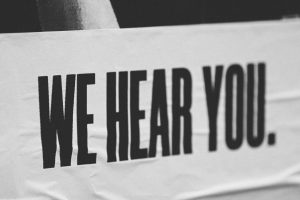
(Scott) Absolutely.
I love this idea you credited Marshall with of feed forward. What we’re seeking is how to do it better, how to do it differently, how to change something to get a different outcome next time when we think about what’s happening in the world of work.
When we talk in generalities, there are many exceptions to it. In general, the younger generations want a lot of feedback. They want a lot of information about how they’re doing. When we can think of it inside that frame, we are helping to support them in doing it better next time. It can also change the way we give feedback, and the way we structure it so it can be something they can hear.
(Scott) The third part of the openness framework is you have to be open to taking action. Being willing to change and taking feedback is good, but if you’re not going to do anything with it, you’re not coachable. For a lot of people, that’s a real stumbling block. Listening to what you’ve been told, making those changes, and moving forward is critical.
The last part is in order to create sustainable change, you have to be willing to be held accountable. The other ones sound hard, but at the end of the day, accountability is the hardest.
I agree. I did a workshop yesterday with about 20 senior leaders in an organization, and we had a whole conversation about accountability. I asked, “When I say the word accountability, what do you think of?”
In the beginning, there were positive words about accountability, moving forward, trust, and connection. Then it got to punitive, and hierarchical, and those among us who have used accountability as a hammer. We have baggage around accountability. It’s one of those words that can be loaded.
(Scott) A lot of people love holding other people accountable. That sounds pleasurable. Being held accountable might be less pleasurable, but once you get your head around it, it’s a gift. Having someone give you the gift of accountability and making sure you continue to be as close to your fullest self as you can be… We all want people around us like that. It may be painful from time to time, but it’s worth it.
(Jacquelyn) As you said, it’s learning to be comfortable with being uncomfortable. That’s what it takes to get where we want to go. The sports metaphor is one that always helps people understand coaching because so many of us have participated in sports in some form or fashion. An athletic coach is someone who’s going to hold you accountable to show up at practice and do the exercises.
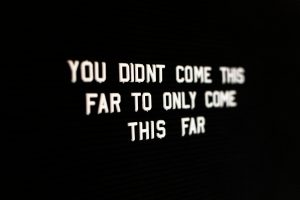
You might not want to do the exercises, you might want to go home and watch TV. Deep down you know you should show up and put in the work. You have to do the reps if you want the results. That’s a lot of what accountability is about.
(Scott) When it’s time to show up for the game, when you need that experience of having done the work, that’s when it pays off.
When I talk with organizations about accountability, one of the things that historically has happened is we as managers say to somebody, “I need you to be accountable for this.” That’s the end of the conversation.
In 21st-century management, it can be much more of a conversation about accountability, why it matters, and how it connects to the rest of the organization. That conversation leads to what I call the two partnership questions. The first is, can you be accountable for this? Often as managers, we say, I need you to be accountable for this. That’s the end of the conversation as opposed to, can you be accountable for this?
If we’re asking that question we also have to be ready for the answer to be no. Then we get to ask why and dig deeper. Do they not have time or the bandwidth? Do they not know if they can do the task?
Once we get to a yes, the next question is, what else do you need from me to be accountable for this thing? That creates a partnership and an ongoing opportunity for connection and accountability. This brings up the thought of the boss as a coach, as opposed to a boss who is in command and control, which is a whole new paradigm many organizations are struggling to grasp.
(Jacquelyn) It’s a partnership. It takes two people. It takes two parties to do it well. It’s easy to say you want one thing, but most good things in life and business happen in relationships, partnerships, and collaboration. Your example is one of collaboration and that’s part of what makes us better and stronger.

I love this. We’re open to change. We’re open to change and feedback. We’re willing to put it into action. Then it’s about accountability.
I want to give a real-life opportunity for this. I have a client, we’ll call her Meredith. She is fantastic. We’ve been working together for four years. She has her own business and she is an investor in other businesses. We mostly work on what’s happening inside her organization.
A few months ago she asked me to work with an organization in which she’s an investor. I met with the CEO of this other company, we’ll call him Fred, and I had several conversations with Fred.
What became clear was Fred is very proud of the fact he has built a million-dollar organization and he doesn’t want to be held accountable for that last year. He was able to get PPP money. For anybody who doesn’t own a business, that’s money the federal government gave to organizations that kept employees through COVID-19. They were able to get almost $200 thousand in PPP money. They show on their books that they lost about $7,000 last year.
Most businesses can withstand losing about $7,000. The problem is the only reason they’re showing a loss of $7,000 is because they got $200 thousand in PPP money and that’s not coming again this next year. Fred didn’t want to look at it that way. Fred wanted to look at it in terms of having a million-dollar business and money in the bank. The fact is, it’s a structural problem.
I went back to Meredith saying the problem is Fred is not being coachable. Meredith is so coachable she had a hard time understanding this concept of coachability. She couldn’t understand why Fred wasn’t benefiting from the same type of work I’ve done with her.
I ended up telling her if we couldn’t get a handle on this with Fred, we would need to bring in another person to do some risk assessment. If things don’t turn around, this company is going to fail this year because they have a $200,000 problem they’re not willing to work through.
When you get in a situation where you’re working with somebody who doesn’t want to look at the challenges… Fred said he didn’t respond well to negative input. I explained it wasn’t negative input, it was simply the facts. The facts are that he has an amazing business that has grown, but it has a structural problem.

There was an unwillingness to dig in and figure that out. From your enormous wisdom, Jacquelyn and Scott, what are the opportunities here?
(Scott) Going back to the framework, it sounds to me like the fundamental problem is Fred is unwilling to change. One way to frame it for Fred is to say, “It’s great you’ve gotten here. You have money in the bank, you’ve got a good business. But as we look at the projections going out, we can all agree you’re going to have to change.” One way to frame change that makes it a little bit easier is to say, let’s create some change that creates growth and expansion.
We don’t have to say, you’re doing something bad, we’re going to have to change. We can frame it as we can all agree this is a business we want to grow and expand, what are the changes we could be considering to create that growth and expansion?
If he becomes open to change, then you can move even more forward by asking other stakeholders for their input. Then they feel included in what’s going on, and you get ideas from them about how to achieve goals and objectives. That changes the trajectory for Fred.
You might want to hold the accountability one aside until you get a little further down the road. That first step might loosen him up a bit to realize change is something he wants because he does. Deep down he knows that $200,000 is not repeatable.
(Jacquelyn) Part of why we chose the words “open to” to begin all of these four elements is it’s not about being perfectly accepting of all change, perfectly hearing all feedback, or taking action on everything. You have to be selective. We can’t do everything.
Being open is a great step in the right direction. If you can find one little thing you think he’ll be open to changing, open to hearing, open to taking feedback on… It sounds like for him, that’s framing things in a more positive light. If you can find that way in, that’s enough to get the flywheel turning.
I love that idea. He is always thinking about expansion, and he has a plan to open a satellite opportunity, which is great. Scott, I love what you said, on the way to growth, there might be something we could look at here.
I love the opportunity to bring in stakeholders. So far he hasn’t been super open to that plan. As we all know, in working with other people and looking at ourselves, we change along the way. Even if we aren’t open to something at one point, we might be open to it at another. That’s an important thing for us all to remember.
(Scott) Maybe he has a barrier in thinking other people might have the answers, but we don’t have to steer into that. We can say other people like to be heard. Listening doesn’t mean you have to accept their answers or do anything about it, but it does mean they become part of your team and go with you on the journey. Let’s face it, if you could do this alone, you would, but you can’t. The more you want to expand, the more you’re going to need the help of others.
(Jacquelyn) Especially key stakeholders like investors.
When we think about anything significant we’re up to, as you were saying earlier, Jacquelyn, we’ve got to involve other people. Most significant things we do, we can’t do on our own, even though Scott, as you wisely said, we might like to. We can’t. We’ve got to involve other people. It’s interesting, when you were talking, Scott, about how people like to be heard.
This is one of the big changes happening in the world of leadership and management. We’re figuring out how to listen differently, how to take everybody’s thoughts, and close the communication loop. I was working with the CEO of a fairly large financial services company recently, and one of the things we were talking about is he has been reticent in the past to close the feedback loop.
You say to people, I want your thoughts about this. They give you your thoughts, and you do whatever it is that you do. The key new thing is then going back to folks and saying, “I heard you when you said we need to do B, and for these reasons and maybe some other reasons I can’t share with you at the moment, we’ve decided we’re going to do differently, but it doesn’t mean we didn’t hear you. It doesn’t mean that we weren’t listening. We were, and we’re going to do this other thing.”
Closing that loop so people know they were heard. Sometimes the way we think it ought to go isn’t the way it’s going to go.
(Jacquelyn) What I love about that example, Janine, is it’s the key difference between feedback and accountability. Feedback is collecting that information.
Accountability is when you go back and say, “Thank you, I heard you and I can’t do everything. I appreciate your commentary on all the different blind spots in my leadership growth areas, and I appreciate it. I can’t change all of it at once. I’ve picked this one thing I believe is the most important thing for me to focus on. Will you help me?”

Closing that communication loop is an essential piece. That’s one of the keys to creating lasting change.
I love what you said, Jacquelyn. “Can you help me with this? Will you be with me in this?” That’s also saying, “Here’s the thing I’m going to work on and I don’t have a magic wand. I’m not going to be able to immediately change it about myself, and I would like you to continue to hold me accountable, to remind me in as positive a way as can be when I forget, when I have an opportunity to do the right thing, and I make a different choice. I want you to continue to play with me in this as I continue to learn.”
(Jacquelyn) Exactly. In some cases, it might even be a disagree-and-commit anyway situation. They may not agree with whatever change the company is making, but if you’re enlisting and enrolling their support and help, they may decide to come along on the journey anyway. You can turn someone who disagrees with you into an ally and friend.
That is something we were talking about yesterday in the leadership workshop because you’ve got a group of 20 leaders in an organization and not everybody is going to agree on any direction at any particular time.
It’s figuring out how to say, “I heard you and we’re going to do this other thing, and I need your support, I need your engagement in it. I need you to, even if you disagree, get behind us and push.” That can be tricky. Is that something you guys have experienced in coaching? How do you disagree and move forward anyway?
(Jacquelyn) That’s the challenge of leadership.
It’s a blessing that we live in a culture where we can all have some level of input and ability to speak our minds. In more hierarchical command-and-control past leadership styles that wouldn’t be the case. It’s also a double-edged sword when everyone can share their opinion. It becomes a challenge for leaders to learn how to navigate and manage that so people feel seen, and heard, and realize they’re part of the same team.
We all have goals and ambitions, and it’s going to take all of us to achieve them. Learning how to enlist and enroll those people and navigate those conversations, that’s the challenge a lot of leaders need coaching support on today.
(Scott) Well said. The real challenge is making people feel heard. People realize there are going to be multiple opinions and someone’s going to have to make a decision. If they feel they’re part of the process and that their opinion has been heard and considered fully, that’s sufficient in most cases.
There will be cases where it’s not. For all leaders, however, and especially those leaders who make people feel they are heard, the more input they can have, the better.
One thing we see all the time is a great coach helps a leader be more accessible so they can get the information they need to make the decisions they have to make.
If leaders are not accessible, if their frontline staff feels they can’t be honest with them, then leaders are never going to be in a position to make good choices about things because they don’t have all the information or the right information.
(Scott) One of my favorite examples of this, which we wrote about in our book, is the example of Hubert Joly, the former CEO of Best Buy. He was a highly accomplished McKinsey consultant and the CEO of another company, he always had all the answers. He got to Best Buy at a time when all the other big boxes were falling apart. All of the investors and the market itself were saying Best Buy was doomed.
He gets there and spends a moment trying to figure it out. Marshall was coaching him at the time and he realized he didn’t have the answer. He decided the answer had to be on the front lines. He went out into the stores and said “My name is Hubert, I’m the CEO of Best Buy, and I need help.”
He got the answers from the employees of Best Buy. By implementing those answers, he turned the company around and created one of the great American success stories through his humility and ability to ask for help.
Brilliant. I want to pivot a bit and talk about 100 Coaches. I was having dinner with a group of about 10 folks a couple of weeks ago and was sitting across from this young woman who is the managing partner at a law firm. She asked if I was a coach and I said no, I do organizational development.
She said, “I think I need a coach.” I responded, “I know a lot of coaches, tell me why you need a coach.” She replied, “Because everybody has a coach these days.” I started laughing and said, “That’s not untrue, and it’s not a good reason to get a coach.” For our interested readers, tell me more about 100 Coaches.
(Scott) Sure. It’s such a privilege for us to be leading in creating 100 Coaches agency. It started with the 100 Coaches community, which Marshall and I founded eight years ago, bringing together some of the best executive coaches, leadership thinkers, and leaders in the world. It turns out it’s hard to find a great coach. We had been aggregating some of the great coaches into this community.
People started calling. We casually started recommending people and then realized there’s a process to finding a coach. It starts with understanding why people need a coach. What are you looking for in a coach? It’s about understanding what a coach can unlock for you. Whether you call an agency like us or you’re doing a search on your own, it’s important to identify three coaches.

When you call the agency, we do the work. We call it our discovery call. We’ll often spend half an hour with someone trying to understand what they want to gain from a coach. What are their ambitions? What would success look like?
Then we come back three days later with three coaches. Again, you can do this on your own. “Here are three coaches we think would be great coaches for you.” Now, in our case, we know they’re great coaches because they’re all in the community. The other thing that’s a bit magical about what we do is we try to identify three coaches who are different from each other.
One of them may come from an executive background that’s similar to the background the executive is in. If it’s an executive presence, another one could be a specialist in executive presence. We try to figure out three different approaches to coaching so when you have your chemistry call with each of those three people, you learn something more about coaching and what coaching can do for you, but also identify the thing in yourself you’re searching for.
Each of those first coaching calls is going to help uncover that. We then have a third call where we listen to what it is the person found. Usually, they figure out which coach is the right coach for them, but sometimes it’s more subconscious.
I have to confess when people say they love them all, we consider that a badge of honor for us because we do love them all going into it.
We call our process curation, we want everything to be curated. If I’m looking for a baker, I want someone to say, here are three bakers, and here’s why I think they’re all great, but you should interview them.
I need a new couch. Here are three couches that are good options…
(Scott) It’s worth taking the time. It’s a meaningful investment of money, but more so, it’s an investment of time, in the time you spend in coaching, but also for us, an initial coaching engagement is typically six months. You’re expecting to advance your career, or your business over six months. If you pick the wrong coach, you’ve lost that six months you could be advancing.
(Jacquelyn) There’s also the factor that started us on this conversation, which is how coachable are you. That’s an important question to ask from the beginning. The other piece of it is, as Scott was saying, who’s the right coach? Who’s the partner that’s going to help be that guide for you on that journey?
The other question I’ve heard is, when do I know if I need a coach? Our shorthand for that is, if you are a value creator, a value-creating leader with a major opportunity or inflection point ahead of you, that’s a good time to seek the guidance of a coach because there’s some risk for navigating that maybe suboptimally. There’s a big opportunity ahead if you can navigate it well. You might as well give yourself a good chance and get the support that you need.
(Scott) Precisely.
Fantastic. This has been a delight. Thank you so much for sharing your wisdom gained, for sharing your framework, and for sharing your curation approach. I’ve enjoyed our time together and appreciate you guys taking the time to be here with us.
(Scott) It’s been our pleasure, Janine. Thank you so much.
(Jacquelyn) It’s been a great conversation. Thank you.
You’re welcome. This has been The Cost of Not Paying Attention, and I’m your host, Janine Hamner Holman. Remember, great leaders make great teams. Until next time.
Important Links
About Jacquelyn Lane and Scott Osman
 Jacquelyn Lane is the president of the 100 Coaches Agency and co-designer of their proprietary curation process and relationship-first philosophy. She has been with the agency since its founding and is a critical pillar of the 100 Coaches Community. Jacquelyn comes to the world of executive coaching through her previous roles in the energy industry and her lifelong commitment to improving the lives of all people by elevating the quality of leadership.
Jacquelyn Lane is the president of the 100 Coaches Agency and co-designer of their proprietary curation process and relationship-first philosophy. She has been with the agency since its founding and is a critical pillar of the 100 Coaches Community. Jacquelyn comes to the world of executive coaching through her previous roles in the energy industry and her lifelong commitment to improving the lives of all people by elevating the quality of leadership.
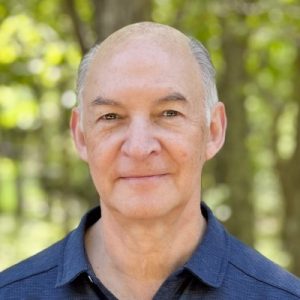 Scott Osman is the founder and CEO of the 100 Coaches Agency and co-designer of their proprietary curation process and the company’s relationship-first philosophy. In his role as CEO, he establishes the vision for the company, leads partnerships and business development, and serves as a leading light of the 100 Coaches Community, which he co-founded with Marshall Goldsmith in 2016. He is the co-founder of Methods by 100 Coaches, the online learning platform. His previous careers include brand and innovation strategy, owning a design firm, running an incubator, creating an MBA program, and fashion and portrait photography.
Scott Osman is the founder and CEO of the 100 Coaches Agency and co-designer of their proprietary curation process and the company’s relationship-first philosophy. In his role as CEO, he establishes the vision for the company, leads partnerships and business development, and serves as a leading light of the 100 Coaches Community, which he co-founded with Marshall Goldsmith in 2016. He is the co-founder of Methods by 100 Coaches, the online learning platform. His previous careers include brand and innovation strategy, owning a design firm, running an incubator, creating an MBA program, and fashion and portrait photography.
